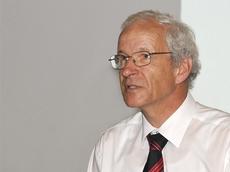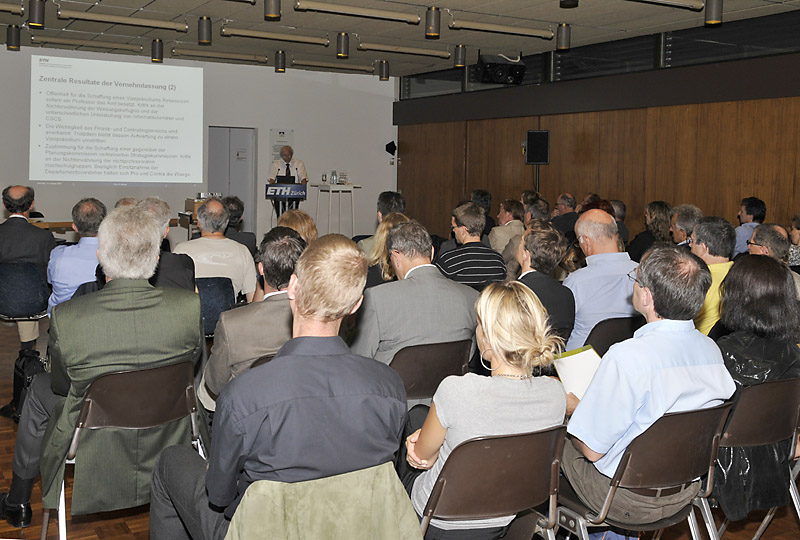Strengthening the quality of management
The management structure of ETH Zurich will undergo important changes as of October 1st. The Executive Board plans to arm the technical university with clear responsibilities for the future: focusing the President’s office on the strategic areas of professorships, policy and fundraising; concentrating and strengthening the resources, personnel and finance sectors – these are the central points of the changes presented by ETH Zurich President Ralph Eichler to the participants at the consultation hearing on 19 August.

Professor Eichler, in view of the growing challenges in recent months, the Executive Board has embarked on a major internal series of reforms intended to strengthen the management and organisation of ETH Zurich. After broad consultation and corresponding reworking, the revised Organisational Regulations (OR) are now available and come into force on 1 October. From your point of view, has the work been successful?
Ralph Eichler: Yes, absolutely – even though the consultation exercise showed that much, though not everything, can be implemented as the Executive Board imagined it. However, this is all part of an undertaking of this kind. What pleases me in particular is that the departments and infrastructure areas showed great confidence in our Executive Board, and collaborated constructively in the thinking and design. They share in the central ideas of the revision, namely that ETH Zurich must respond to the increasing complexity of its scientific and political environment by showing greater efficiency and professionalism in its management structures. This flexibility shows me that the success and strength of ETH Zurich also lie in the knowledge that we are a unit. This also applies to the Executive Board – we are a team that cooperates tightly.
The plan is to give your own area, the President’s office, the opportunity to focus on the strategic fields of professorships, policy and fundraising. Will you now have more time for these tasks?
Yes. In fact these three areas, some of them new, will occupy me fully. I will add only this: the development of ETH Zurich depends on an increasing inflow of external funding in the coming years.
But of course that’s what it’s all about: in the final analysis, the President is responsible for everything. One aim of revising the OR was to move part of my many duties onto the shoulders of my Executive Board colleagues. The subject responsibilities, the processes and the interfaces, and not least the information flow: they are now all more clearly defined, which increases the efficiency.
You mentioned the increasing importance of the active procurement of funding by ETH Zurich. Is that the reason for upgrading the Finance and Controlling Division to a Vice-Presidency?
The autonomy enables us not only to manage our considerable funds structurally – we are talking about a budget of 1.3 billion Swiss francs – but also to ration them and to set up an efficient controlling system. Of course, this also involves risks. Handling our money properly needs top-class people. It appears to me only logical that this area’s standing requires it to be headed by a vice-president.
However, doubts were also voiced against this upgrading. Without wishing to belittle the importance of a high level of financial competence for ETH Zurich, it was said by some that the Executive Board should be kept streamlined and should, essentially, reflect the academic core business. – How to you respond to this concern?
I understand it, but one could also say that form follows function. In the crucially important area of finances, we want to put into a suitable form something that is already being lived in practice today. I believe it is crucial nowadays to no longer to make any difference in grade between academic and infrastructural requirements in the management of a higher educational institution. Certainly academic function leads the way, but both are equally important in achieving aims. This insight has long been accepted, particularly now in the top US universities.
Strengthening and focusing the infrastructure – how do you implement this central idea?
By creating a vice-presidency
that combines within itself the major infrastructure sectors. In the shape of
the vice-presidency “Personnel and Resources” (VPPR), ETH Zurich has, for the
first time on the Executive Board an area that devotes itself exclusively to
infrastructure, something that is increasingly important for a higher
educational institution. I should also like this name to be understood as a
signal: the VPPR is the most senior head of personnel of ETH Zurich, and in this respect is responsible
for the most important resource, the staff. Personnel development and strategy
is a task that must be taken increasingly seriously, as are real estate
management and the planning that goes with it. New additions include the
Information Technology Services, the ETH Zurich Library and the collections
that it controls. The VPPR’s responsibility for the National Supercomputing
Center CSCS in Manno requires special mention here. The CSCS is a service
provider business with the highest level of scientific competence. In the
consultation hearing it was recommended that the informatics services of ETH
Zurich (ICT) and the CSCS should be placed under the same responsibility – and
we are doing that.
This vice-presidency will also be given a new face at the top, a professor with
a great record of performance in this area. However, all the nominations have
still to be confirmed by the ETH Board, which is expected to take place on 23-24
September.
On the subject of internationalisation, you were unable to convince the majority of those taking part in the consultation exercise with your suggestions, which also included a new vice-presidency. How will you deal with that?
It is a pity that internationalisation is obviously not given the importance that it clearly has in the Executive Board’s opinion. That really astonished me. Perhaps we did not make the need sufficiently clear. However, I take the objections seriously: There will be no Vice-President of International Relations. Nevertheless, those tasks that have been performed up to now in various places and partly uncoordinated must be centralised. A work group exists to do this, and it is to formulate the tasks more clearly. The plan is to have a delegate as a single person to look after the search for good students abroad, their reception, the international image of ETH Zurich and visits by foreign delegations. The choice of the correct cooperation partners is another strategic task. This delegate is located in my department. This means that my portfolio will indeed be larger than planned due to the circumstances.
The Research and Industrial Relations Vice-Presidency (VPFW) headed by Peter Chen receives considerable enlargement in the shape of the strategic development of the university. Which consideration led you to take this step?
The development of a higher education institution like ETH Zurich is determined greatly by the research strategy that it follows. What are the medium and long-term subjects on which we work? The Management Committee must then act on this basis. Of course all areas – the President, Rector and Vice-Presidents, each with their own agendas – take part in formulating these aims. However it seems to us sensible to locate the actual process of the strategy and planning with the VPFW. Naturally the departments will continue to play a central role in planning. What pleases me here in particular is the large degree of acceptance encountered by the new Strategy Commission with greater participation by the departments, and of course by the professions.
At first glance there has been little movement of content in the teaching area. However, lecturer support has been moved from the Rector’s area into the Presidency, and the library has gone to the Personnel and Resources Vice-Presidency. Won’t that be perceived as a loss?
No. One not insignificant aim of the OR revision was to structure processes more clearly and to redefine interfaces where necessary. For example, a process of this kind encompasses the needs of the professorate, from appointment (already the President’s task up to now) to retirement from the chair. The new feature is that the associated sub-processes are now centralised with the President. This involves mainly relocations of an administrative nature. The Rector’s core business is teaching. The reallocation of the tasks in the Lecturers’ Office area takes this into account. The consolidation of the Bologna Reform and the associated internationalisation in the Master programmes area represent new, complex challenges for the Rector. Quality assurance at all stages of training and further education demands the greatest possible attentiveness. However, it is clear that intensive contacts between all Executive Board areas must be maintained in the future as well, and newly emerging interfaces must be defined clearly. As regards the library area: there are concrete reasons for its planned proximity to ICT Management.
All things considered: did the response to the OR Revision meet your expectations?
Yes, and I am very content with it. The general aims of the Revision were accepted. These carefully thought through structural adjustments will enable us to master our increasingly complex tasks – and I look forward to that. As I said, there were differences of opinion as to implementation. However, criticisms also yield important knowledge about the university. For example, one fear was that more vice-presidents would lead to an inflated administration. I can very well understand this anxiety. I will take very great care to ensure that in future management quality is strengthened instead of the administration being enlarged.








READER COMMENTS